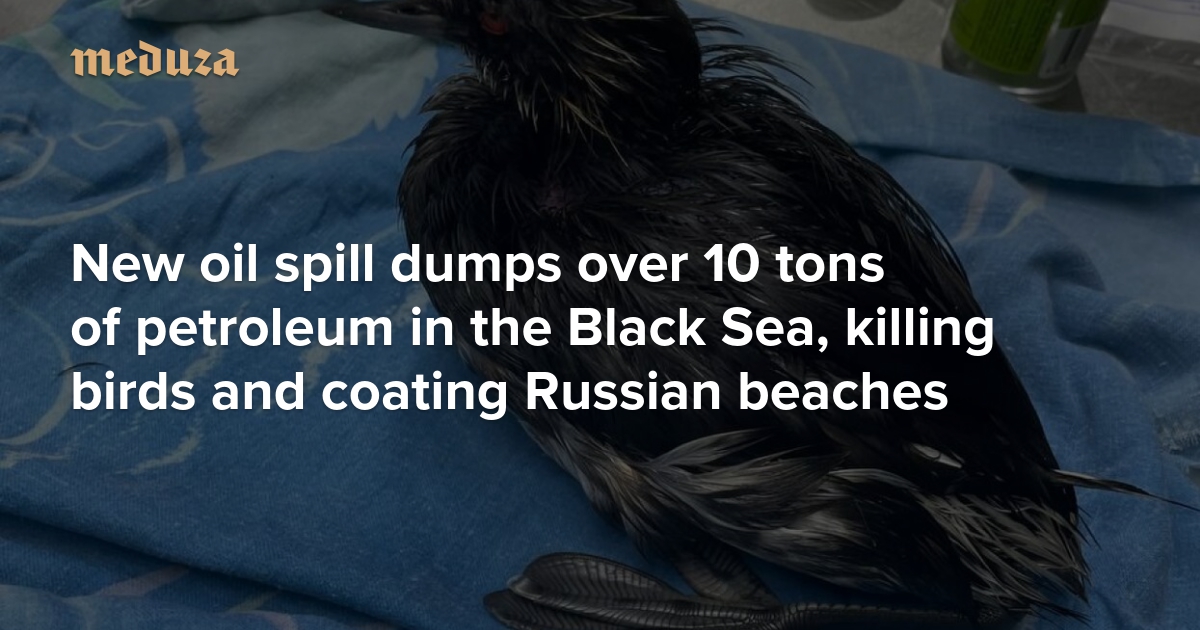Late last year, two Russian oil tankers collided in the Kerch Strait, leaking thousands of tons of heavy fuel oil into the Black Sea. The incident was disastrous for local wildlife and continues to wreak havoc on southern Russia’s tourism industry. Now, less than a year later, the Caspian Pipeline Consortium has announced that a ruptured hose caused a new spill near the city of Novorossiysk. While the leak is reportedly much smaller than the Kerch Strait one, animal rescue workers have already reported finding injured, oil-covered birds. Here’s what we know about the new spill so far.
On August 29, the Caspian Pipeline Consortium (CPC) reported that an “emergency situation” had occurred at its marine terminal near Novorossiysk, resulting in “some amount of oil” reaching the surface of the Black Sea. According to the statement, this happened “during a loading operation onto a tanker.” The CPC said there were no casualties and that the company was conducting “oil emulsion collection.”
Shortly after the CPC’s announcement, the Russian state news agency TASS reported that the spill occurred after a loading hose ruptured while petroleum products were being loaded onto a Turkish tanker called the T. Semahat. The agency’s source claimed that more than one metric ton of petroleum products had spilled. A state of emergency was declared at the terminal. Later that same day, August 29, the press service of Russia’s Federal Agency for Sea and Inland Water Transport confirmed that during a loading operation at the port of Novorossiysk, a “minor oil leak” had been recorded. The agency said that the spill was “quickly contained.” Rosprirodnadzor also reported the that the spill had been contained, claiming about 30 cubic meters of oil had entered the sea.
However, by the evening of August 31, a Telegram channel whose members had helped birds affected by the December 2024 spill posted new photos of animals covered in oil. “News outlets say everything is contained. But in Novorossiysk and Anapa, the sea is still covered with a film, and we’ve received oil-covered birds… four black-necked grebes were brought in over two days, all covered in this stinking liquid. Chemical burns, intoxication, and as a result, dehydration,” the post read. By September 1, volunteers had taken in 24 birds, three of which had died.
Sergei Statichny, a remote sensing expert who works with Russia’s Marine Rescue Service, told TASS on September 1 that the area of the oil spill in the Black Sea was around 350 square kilometers (135 square miles). According to his data, at least 10 metric tons of petroleum products had entered the water.
Based on current [satellite] images, the area [of the slick] already measures 350 square kilometers. In my entire career, I’ve never seen such an extensive film of pollution on the sea. The film remains quite thick for this type of petroleum product. This means that the slick currently contains at least 10 metric tons of petroleum products. It’s located west of Anapa, with a small chance of some reaching the shore north of Anapa. The slick is moving toward Crimea, but for now it’s passing south of the Kerch Strait.
He later stated that the main slick had “broken up,” and that most of it was now located opposite the Kerch Strait. According to him, the total area of the petroleum products had “slightly decreased,” although he didn’t specify by how much.
Meanwhile, Igor Vakhrushev, an associate professor in the Tourism Department at the Vernadsky Taurida Academy, said that the “environmental damage under these circumstances appears minimal,” since the slick is “passing south of the Kerch Strait, avoiding sensitive ecological zones.” “Light fractions don’t settle on the seafloor, so long-term harm to fish and dolphins is not expected — but marine fauna mortality should be monitored,” he noted.
At the same time, environmentalist Igor Shkradyuk told the independent outlet Agentstvo that within 24 hours of the spill, fragments of oil began washing up on the coast of Krasnodar Krai. A photographer from Anapa, Yuri Ozarovsky, posted photos and videos of the oil washing ashore at one of the beaches.
“Right now, the shore smells of petroleum products — people say it smells like diesel. But unlike a fuel oil spill, there’s no black layer along the coast. It’s barely noticeable,” Shkradyuk said.
Ukrainian Navy spokesperson Dmytro Pletenchuk confirmed to journalists that a spill had occurred in the Black Sea. He said oil or unidentified petroleum products had “spilled over a fairly large area” and that the incident occurred in an area controlled by Russia.

